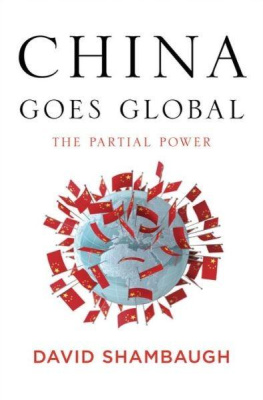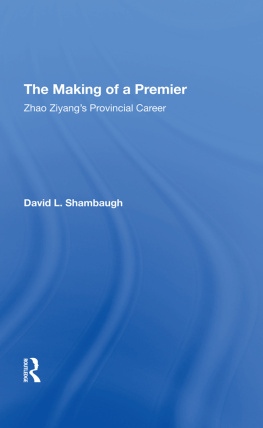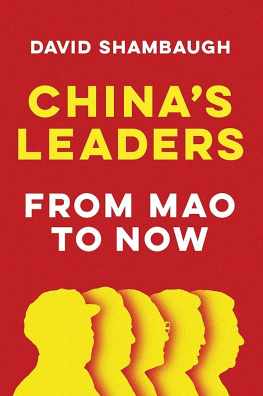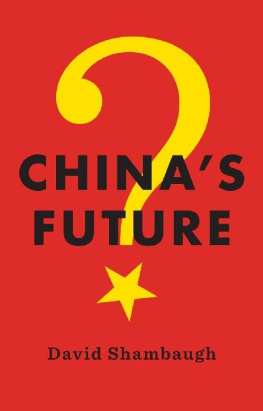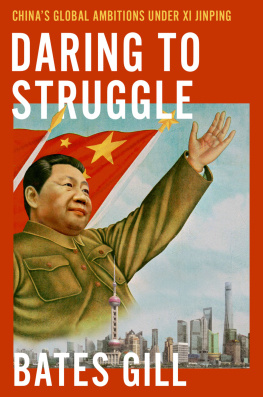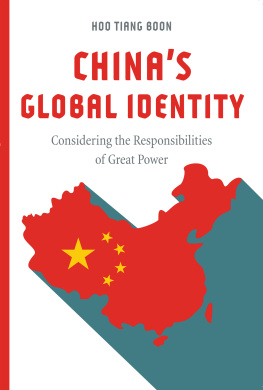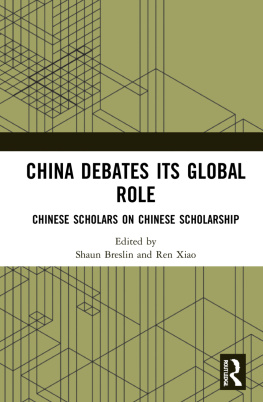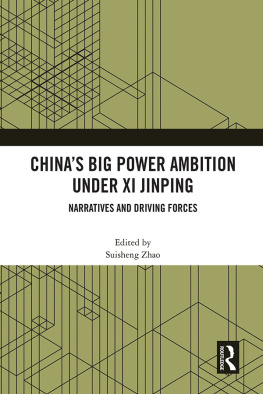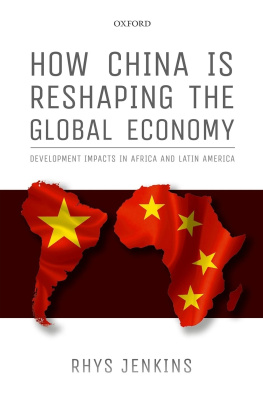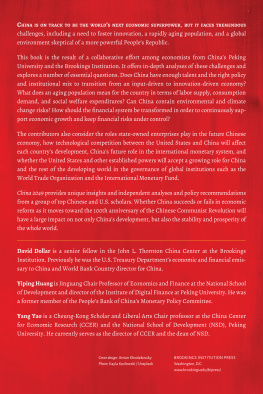China Goes Global
The Partial Power
DAVID SHAMBAUGH
Oxford University Press
To Ingrid, Chris and Alex
Oxford University Press is a department of the University of Oxford.It furthers the Universitys objective of excellence in research, scholarship, and education by publishing worldwide.
Oxford New YorkAuckland Cape Town Dar es Salaam Hong Kong KarachiKuala Lumpur Madrid Melbourne Mexico City Nairobi New Delhi Shanghai Taipei Toronto
With offices inArgentina Austria Brazil Chile Czech Republic France GreeceGuatemala Hungary Italy Japan Poland Portugal Singapore South Korea Switzerland Th ailand Turkey Ukraine Vietnam
Oxford is a registered trademark of Oxford University Press in the UK and certain other countries.
Published in the United States of America by
Oxford University Press
198 Madison Avenue, New York, NY 10016
Oxford University Press 2013
All rights reserved. No part of this publication may be reproduced, stored in aretrieval system, or transmitted, in any form or by any means, without the priorpermission in writing of Oxford University Press, or as expressly permitted by law,by license, or under terms agreed with the appropriate reproduction rights organization.Inquiries concerning reproduction outside the scope of the above should be sent to the Rights Department, Oxford University Press, at the address above.
You must not circulate this work in any other form and you must impose this same condition on any acquirer.
CIP to come
1 3 5 7 9 8 6 4 2Printed in the United States of America on acid-free paper
PREFACE AND ACKNOWLEDGMENTS
As a scholar and public intellectual, I like to try to understand, research, write about, and explain Big Subjects related to China to multiple audiences around the world. The subject of this book certainly fits these criteria: how Chinas emergence as a global power is affecting the world. I decided to investigate this subject because I thought, as a specialist on both China and international relations, I might be able to shed some light on the nexus of these two phenomenaChinaand the worldand thereby could contribute to global public understanding of one of the key issues of our era.
There was a second reason I took on this project: because I am deeply concernedby the academic professions tendency to know more and more about less and less and its increasing inability to generalize about Chinas development(in all aspects). That is, for the past three decades, the academic China community has produced studies of progressively more micro-level phenomena.Although this has perhaps allowed us to know more about the trees, it has not necessarily led to a better understanding of the forest. The excessive disaggregation has not led to better aggregate understanding of China writ large. The rise of China is the big story of our era, and it is incumbent upon scholars to be able to explain China to nonspecialist audiences worldwide. I further feel that scholars increasing obsession with social science theories and methodologies have been further impediments to understandingmore often blurring than clarifying the object of study. Unfortunately, testing of theories and application of methodologies has become an end, rather than a means, to furthering knowledge and understanding. As a result, the academy (universities)in the China field is becoming more and more divorced from its mission: to illuminate and educate. More and better knowledge of China now seems to reside in the professions of business, banking, consulting, law, diplomacy, intelligence, journalism, think tanks, and NGOs than in the scholarly community.China scholars are no longer the go to repository of knowledge on China that they once were. This may be natural, but it is regrettable.
Thus, in part, this study grows out of my frustration with the academic China field. It also grows out of the pressing need to understand Chinas global emergence in its totality. As Napoleon prophetically predicted, Chinas awakeningis now shaking the world. But how? In what ways? Do we really understandthe various dimensions, complexities, and implications of Chinas going global? A skeptic may challenge this conventional wisdom and ask, Is China really shaking the world? Has it really become a global power? How, exactly? Or is Chinas assumed international influence hollow hype?
This study wrestles with these Big Questions, and it provides a straightforwardanswer captured in the subtitle: China is The Partial Power. It is not as important, and it is certainly not as influential, as many believe. The following eight chapters elaborate this theme and offer a wide range of data in as intelligiblea fashion for readers as possible.
China Goes Global has been five years in preparation. I began work on it in 2007, just after completing my previous book Chinas Communist Party:Atrophy & Adaptation. Having delved into Chinas internal political scene in that volume, I decided to devote this volume to assessing Chinas externalbehavior. Even though I have been interested in Chinese foreign policy throughout my career, and have published a fair amount on diverse aspects of the subject, it seemed to me that Chinas emergence on the global stage today consisted of far more than diplomacy. Thus, what I felt was needed was a study that examined various aspects of the totality of Chinas emergence and impact on the world. This is not a book so much about Chinas rise as its spread. At first I contemplated organizing the study geographically, examining Chinas multifarious interactions with different countries and regionsbut, on furtherreflection, I decided a better (albeit more difficult) way to approach the subject was functionally. That is, through individual chapters that examined a number of dimensions of Chinas global footprints: Chinese perceptions of their global roles, Chinese diplomacy, Chinas role in global governance, Chinas global economic presence, Chinas global cultural impact, and Chinas global security presence. This approach allows readers to view Chinas impact in a truly globalrather than regionalperspective.
Any study of this magnitude requires many things. First, on the part of the author, it requires tenacity and patience. There were many days and many points when I lamented the complexities of several chapters and thought it would never end. There was also a constant tension between going into depth, but not too much depth. I had to constantly remind myself to follow my own admonition above to write accessibly and to try and illuminate the Big Picture for general readers. Second, it requires the patience, understanding, and support of family members. My wife of thirty years, Ingrid Larsen, and our two wonderful sons, Christopher and Alexander, offered steadfast support and patience throughout the protracted five-year process, and I therefore wish to gratefully dedicate the book to them. Special mention should also be made of our golden retriever, Ollie, who lay at my feet and stayed by my sideprovidingadoring canine company in what is an inevitably lonely writing process. Third, writers need conducive writing spaces. I am most fortunate to have had that at our home in Arlington, Virginiabut also our apartment in Beijing, and at our family cabins near Old Mission, Michigan. The latter has been a godsend where I have retreated and written for more than thirty years while gazing out over Grand Traverse Bay. Fourth, like all professors, I had to juggle writing with the demands of undergraduate and graduate teaching, doctoral student supervision, program administration, university service, much public lecturing, conference participation, consulting, a lot of national and internationaltravel, and writing articles and editing books unrelated to this oneall while doing my best to be a husband and parent. I even survived one computer crash in which, for a while, I thought I had lost the entire manuscript!

